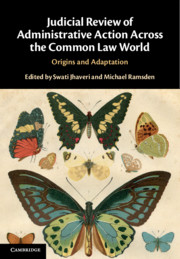Book contents
- Judicial Review of Administrative Action across the Common Law World
- Judicial Review of Administrative Action across the Common Law World
- Copyright page
- Contents
- Contributors
- Foreword
- Acknowledgments
- Table of Cases
- Table of Legislation
- Abbreviations
- Part I Introduction
- Part II Origins and Adaptations of Judicial Review in England
- Part III Origins and Adaptations in the British Isles
- Part IV Origins and Adaptations in North America and Canada
- Part V Origins and Adaptations in the Middle East and Africa
- Part VI Origins and Adaptations in Asia
- Part VII Origins and Adaptations in Australasia
- Part VIII Conclusion: Interrogating “Common Law” Approaches to Judicial Review
- 19 What Is Left of ‘Common Law’ Administrative Law?
- Index
19 - What Is Left of ‘Common Law’ Administrative Law?
Concluding Remarks and a Layout of Future Paths
from Part VIII - Conclusion: Interrogating “Common Law” Approaches to Judicial Review
Published online by Cambridge University Press: 19 March 2021
- Judicial Review of Administrative Action across the Common Law World
- Judicial Review of Administrative Action across the Common Law World
- Copyright page
- Contents
- Contributors
- Foreword
- Acknowledgments
- Table of Cases
- Table of Legislation
- Abbreviations
- Part I Introduction
- Part II Origins and Adaptations of Judicial Review in England
- Part III Origins and Adaptations in the British Isles
- Part IV Origins and Adaptations in North America and Canada
- Part V Origins and Adaptations in the Middle East and Africa
- Part VI Origins and Adaptations in Asia
- Part VII Origins and Adaptations in Australasia
- Part VIII Conclusion: Interrogating “Common Law” Approaches to Judicial Review
- 19 What Is Left of ‘Common Law’ Administrative Law?
- Index
Summary
This concluding chapter aims to bring together the themes explored in the book, and to identify several research contexts that can largely benefit from the collection. Part I offers a birds-eye view of all book chapters, noting the differences in the evolution of the analysed systems’ administrative law. Swati Jhaveri’s five-pronged typology of the public law of common law systems, presented in Chapter 1, is discussed in Part II, which explores several aspects of each of these sub-categories, critically considers their internal logic, and assesses the utility of this typology. Part III aims to provide a tentative explanatory framework for the analysis of the reasons that have led to the different transformation patterns of the administrative law of these systems. Three bodies of social science research that study change but have little to say on legal change are addressed, and supplemented by an application of Donald Horowitz’s four approaches to legal change, which offer explanatory paradigms for legal change over time. This part ends with a proposal of a five-dimensional grid designed to ease the process of defining factors that may have implicated on change. The chapter ends with a discussion of the robustness of the classic classification of legal systems into ‘legal families’ in general and of the common-law family in particular.
Keywords
- Type
- Chapter
- Information
- Judicial Review of Administrative Action Across the Common Law WorldOrigins and Adaptation, pp. 349 - 373Publisher: Cambridge University PressPrint publication year: 2021



